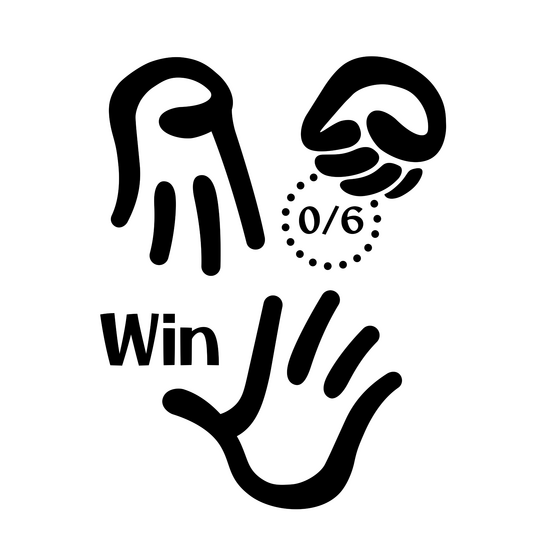How to Play:
Let's play

The Ready-to-Go
Roleplaying Game
by David Bowers
Redígo is now available as a download from redigo.itch.io.
You can print a trifold brochure or use the PDF formatted for your phone!
Update: More Ways to Play!
Just Add Creativity
Redígo (re•dee•go) is a game of narrative hand signs for roleplaying on the go. You can play on a walk, in a car, around a campfire, or even inside a cool fort made of blankets and chairs. It doesn't require dice, paper, or even a tabletop. All you need is a creative mind and someone to play with.

Build Your Story
In addition to helping you resolve uncertain outcomes, Redígo has some useful principles and guidelines to follow that make share storytelling better. If you're having trouble coming up with ideas, or communicating about them, these can help.
Pick a Role
At heart, Redígo is a way of playing through conversation, and making decisions about your story together. You bring your own ideas to the game, and then the game’s rules and procedures help you find out what happens next.You can pick up where any other tale left off, give life to your original story concept, or just take bits and pieces from your favorite legends and mash them together. Follow your inspiration and trust your creativity! You can do this.

There are two roles in this game, the Guide and the Actor, but you can switch or share these roles at any time. As long as someone is playing each role at any given moment, the story can move forward, like this:
Guides describe key details, interesting mysteries and difficult problems in the story situation. Skip over any boring bits.
Actors decide how a character (or team) tries to act to change that situation, solve the problem, or uncover the mystery.
Guides respond to that by updating the situation (back to #1).

Much of the time, roleplaying is just sharing back and forth like that. You say what happens, then I say what happens, then you again. Each side agrees that the other's creative contribution makes sense. But often the situation feels risky or uncertain to one or both sides. If there is any doubt about the outcome, that’s a risk! And that’s when we use Redígo’s special hand signs!
Taking Risks

It’s fun to get into risky situations and let the hand signs tell you what happens! The results either give you what you wanted or send you off in some other interesting direction (and sometimes both)! You can use them for all kinds of uncertainties, from dangers and challenges to random encounters. To take a risk, first take a moment to look at the possibilities:
Actor: What does your character want? How are they trying to get it? Who or what is helping?
Guide: Consider this outcome fairly:
Is it likely, unsure, or unlikely?
Could the Actor's character pay a price to get it, if they need to (such as using up a resource, getting in trouble, etc.)?
What could could happen if things go wrong?
Actor: Do you accept the risk? Will you try another way or go ahead with this?
If you accept the risk, that means the hands of fate will decide! To find out what happens, both Actor and Guide play a game of chance: Say, “re-dí-go!” and show one of the six narrative hand signs (pictured below).Each side will compare their number to the other. But how do you know what it means? Keep reading to see the results.


Getting Results
Can I Go Again?
If the Guide thinks your risk is likely to succeed (or isn’t sure) then, yes!
☞ If your risk is unlikely, you only “go” once.
☞☞ If you’re unsure, go again: 2 “go”s in total.
☞☞☞ If it’s likely to succeed, you get 3 “go”s!
When you’re out of “go”s, you can keep and combine the results you like:
You can choose: do you prefer a Miss or a Win?
Think creatively: Maybe failure is a good thing?
You can get what you want, and also another chance!
You can count this as a regular Miss.
or even as double trouble if you like!
or you could pay a bigger price for a double Win.
You can count this as a regular Win.
or you could count each extra Win as even more of what you wanted!
You may not get what you want, but maybe each extra Match makes it an even better bonus or opportunity!
What’s Next?
If the Actor got an opportunity, they can act again right away. Otherwise, the Guide will update the situation and decide what’s next, usually the next logical problem or mystery that would follow after the result of the risk.You may want to talk about what it means together. If you’ve already accepted the risk, then you may already know. If not, talk about it and choose an interpretation that makes sense to all players.
More Ways to Play
More Ways to Use Wins
These rules not only show more ways to play, but also give you an example of how you might expand or modify Redígo to suit your own creative style. The goal is to help empower you to choose and use just the tools you want and even inspire you to experiment with creating your own!
More Ways to “Re-dí-go!”
If you prefer not to use hands for “Re-dí-go”:
You can use your voice on its own. Both sides say “Re-dí...” but instead of saying “Go!”, they say the number of their choice. For example, if one says “Re-dí-Five!” and the other says “Re-dí-Zero!”, that's a Win because zero also counts as a six. Here are some situations where you might want to use this:
Playing in a car. The driver can keep their hands on the steering wheel and their eyes on the road.
Playing in the dark when the power goes, or for a few minutes while winding down for sleep. (Be sure to keep this light, no scary stuff.)
Playing on the phone with someone you really like but don’t really have a lot other things to talk about with.
Playing with anyone who has limited use of their hands or fingers due to paralysis, arthritis, amputation, or the like.
If you have more than two players, try to limit this approach to only two voices at a time. Any more than that could make it hard to hear the numbers.
You can use any regular board game dice with six-sides. You can roll for the Guide’s number, or just pick a number and roll one die for each Go you have. This gives you the same spread of numbers as you can make with your hands (counting 0 and 6 as the same, of course). For example, if you picked a 6 as your number, then rolled a 1 (Win), a 4 (Miss), and a 6 (Match), you could keep the Win & the Match and move on with the story. Here are a few situations where this might be useful:
You just love dice! (I love dice, too.)
You’re playing online using a video-call service, but there’s just enough delay that playing “Re-dí-go” the usual way feels out of sync. You can search on the internet for “roll dice” to find a dice-rolling web-app and use that. Some apps allow you to share a virtual table for the dice or share your screen so that all rolls are made out in the open. Or, you could just point a camera at your table and roll physical dice. See what works best for you!
You can also use dice to play Redígo solo: all on your own without any other players! You can play the role of both Guide and Actor at the same time, and use the dice to introduce twists and turns and inspire your imagination. This takes even more creativity than playing with other people, but it can be just as fun. To help you with this, you can use oracle cards (such as Tarot), as well as other forms of inspiration (such as picking random words from a book).
More Ways to Win
This one rule can help with many situations:
Multitask: To do 2 or more things at once, count each Win as 1 thing done.
Complex task: You can do it well, fast, or cheaply (pick 1 for each Win)
Longshot: To do something very unlikely (but still possible):
3 Wins: you do it well.
2 Wins: you do it, just barely.
1 Win: you don‘t do it yet, but you still have a chance, for now.
Area of effect: 1 step bigger for each Win.
Search: With 1 Win, you find it. WIth 2 or more Wins, choose 1 for each extra Win you get:
you find it faster
more of it
other things like it
Travel: How many steps will the journey will take to complete?
Win: one step each, on schedule.
Miss: trouble, loss, or delay.
Match: a shortcut or new direction.
Certain success: You’ll definitely do it, but the only question is how well; start with 1 Win for free, and then any more you get just improve the outcome.
Certain doom: It’ll definitely be bad:
1 Win: It’s a bit less bad.
2 Wins: It’s a lot less bad, actually!
3 Wins: Eh? Nothing bad happened?!
Strong effect: You may not get what you want, but if you do, you’re likely to get more of it; take 1 more Go for every Win you get.
For example: if you start with two Goes and get two Wins, you can take another two Goes. If any of those is another Win, it gives you another Go, and so on until you stop getting Wins.
Be careful with this rule! It’s possible to get so many Wins that you don’t know what to do with them all.
Making Opportunities: All you want is to create an opportunity for yourself or someone else; you can count each Win as a Match.
Also, to find out how good your opportunity is, consider how many Matches you got:
1 Match: Unclear — it could be good, could be bad.
2 Matches: Definitely good.
3 Matches (or more): Fantastic, maybe even certain!
Example: You assist someone with both 1 Win and 1 Match: definitely good. Now, they could be more effective, or get better chances, or maybe you just made a new approach possible!
More Ways to Go
To find out how good your opportunity is, consider how may Matches you got:
Unclear: maybe good, maybe bad.
Definitely good.
Fantastic, maybe even certain!
Example: You assist someone with both 1 Win and 1 Match: definitely good. Now, they could be more effective, or get better chances, or maybe you just made a new approach possible!
Principles of Play
As you play, try to follow these principles:
Share the spotlight generously, so that everyone has a chance to participate.
Will you take turns? Raise hands? Converse normally? Something else?


Give your group feedback so they know if you’re having fun or not. For example:
Thumbs up for interest and curiosity
Wobble fingers to request suggestions
Cross hands (X) to cut something out
Set and evolve your team’s boundaries.
Trust your creativity! You can do this!
Be inspired by worlds you know, but flip them or mix different ideas together.
Follow your curiosity like a guiding star:
Ask each other interesting questions.
Offer each other interesting choices.
Build on the most interesting answers.


When you need to fill in the blanks in your memory or imagination, ask for suggestions, then choose one.
Remember that all realistic and fantastical powers have limits, risks & costs.
Resolve conflicting ideas in peace:
Play “re-dí-go” & let chance decide.
Let the quietest player choose.
Feel free to expand this game with your own rules and exceptions to the rules.
If there’s time, take the story all the way to a satisfying conclusion.
Otherwise, leave it on a cliffhanger, to be continued later, or perhaps to be pondered in future daydreams.

Example of Play
Sometimes the best way to learn how to play is to see or read about other people playing it. Hopefully this short example will help!
Parent: Okay, what are we playing today?
Child: I’m a scientist centaur in space!
P: Cool. What are you doing in space?
C: I’m exploring in my spaceship, looking for a planet full of sweets. I’m hungry!


P: A candy planet? There aren’t many of those. Your chances are low: 1 Go, okay?
C: But I’m a scientist. I know a lot about space, and I have scientific instruments!
P: Hmm. Okay, you get two Goes then.
C (showing hand signs): “Re-dí-go!” It’s a Match! One more: “re-dí-go!” ...a Win?
P: Well, you’re 4, and I’m 0. If you showed 1 or 5, that would be a Win. This is a Miss. That means: pay a price to Win or something goes wrong... maybe a gigantic space squid!
C (making an X with hands): No! I don’t like space squids. Besides, I got a Match too!
P: Oh right, I forgot. Okay, that means it’s a special opportunity. Maybe something better than a candy planet? A restaurant?



C: Yeah! Centaurs eat healthy hay!
P: Haha, yes! A busy tavern planet, where savvy aliens from around the galaxy eat and share rumors of adventure! Sounds fun.
C (making puppy eyes): Can I have a snack?
P: Oh! Sure. Let’s go make sandwiches and continue this story in the kitchen.
About this Game
License
Redígo Core Game is a work by David Bowers.It is published under a CC-BY 4.0 license.Basically: feel free to use these game mechanics to publish or even sell your own games, but just give me credit for the parts I wrote.


Special Thanks
This work is inspired by: Rock-Paper-Scissors, Tiny Dungeon, Mouse Guard, Lasers & Feelings, Do: Pilgrims of the Flying Temple, Apocalypse World, Blades in the Dark, Fate, Ironsworn: Starforged, Werewolf (the social deduction game also known as Mafia), and more.Special thanks to Tim Devine of Dice Up Games, author of Adorablins and Color My Quest, who was an excellent mentor, and without whose guidance this game might not have been possible.
About the Author
David Bowers is a teacher who uses Redígo as an educational tool in his online roleplay & writing classes. He was born in Colorado, USA, spent many years teaching English in Nanjing, China, and now lives with his wife and two children in New Delhi, India. You can learn more about his classes at ArisetoLearn.com.

Get in Touch!













